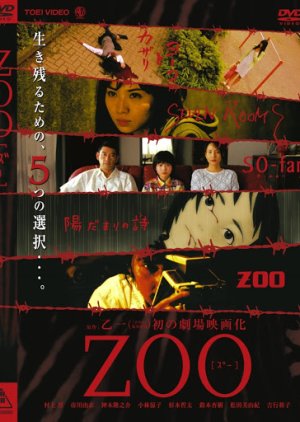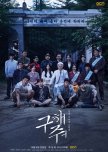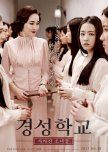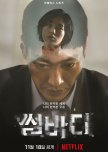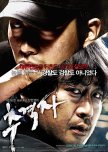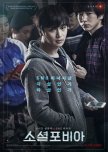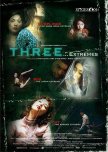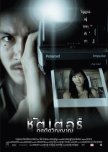
A nearly perfect movie
Wow. I found this to be a nearly perfect movie. It completely bowled me over.A strong movie not for the faint of heart. Each segment will draw you in deeper. Powerful stuff. Hard to watch at times. Each segment is very short yet manages to get a lot done. This one is a roller coaster and I am surprised more people don't talk about this movie. The one word that best fits this is "BRUTAL". This movie shows you don't have to load up on guts and gore to put a viewer through the wringer.
It’s an anthology movie of five stories, based on the excellent dark fantasy collection ZOO by the Japanese author Otsuichi. I didn’t realize it as I was reading the stories, but they were perfect for adaptation to the screen. All the episodes are excellent. A lot of this is not easy to watch. Not because it’s gory, but because it’s emotionally wrenching. If you’re not wrung out by the end of this sucker, you kind of scare me. And that’s hard to do.
The "SO Far" title looks suspicious because it's meant to mean "significant other far (apart)." I think it's best to view this tale as a metaphor for divorce and how it impacts the child and puts them in weird, awkward situations where they must choose between the parents. In this regard, this segment is brilliant and felt realistic to me. It can be needlessly confusing with many ways to interpret things, but that adds more to think about. And that milf...
Beautifully filmed by five different directors, the author’s strong storytelling ability holds the whole thing together. If you like Japanese fantastic cinema, don’t miss this.
Was this review helpful to you?

This review may contain spoilers
Honestly. "So-Far" might be one of the most terrifying things I've ever seen.
Honestly. "So-Far" might be one of the most terrifying things I've ever seen.“I want you to learn about death.”
-The Scientist (No idea who voiced him, as little information is available on this anywhere and I can’t read the Japanese credits)
I’ve always personally had a thing for anthology films, particularly those within the horror genre. I guess the attraction stems partly from the marvel at any filmmaker whom can make anywhere between a 25-40 minute story as effective as one lasting say, 2 whole hours, and also because it’s very much a ‘lucky dip’ format for film. Variety is the spice of life, and the unexpected is that which excites the most. As such, this sub-genre has found a place in my heart, despite (or perhaps because of) the variation in quality. Though the anthology film was at its most popular during the 1970’s and 1980’s, it has recently seen a bit of a revival, especially in Asia, which has produced a handful of real gems recently.
Zoo is one such gem, one of the most underrated and criminally underseen anthologies ever made. Of course like all anthologies, one must approach with a certain amount of trepidation, but for me this is likely one of the most consistent in regards to quality, on par with the likes of Three…Extremes. Once more, I’ll opt for my anthology review format and give you the lowdown on each of the five segments from five upcoming Asian directors.
Kazari and Yoko
Directed by: Ryu Kaneda
The first segment, titled Kazari and Yoko and directed by Ryu Kaneda, follows a family in which one daughter is loved whilst the other is neglected by their single mother, taking parental favouritism to the next degree. This story is rather simple, but is not hindered by it and is actually rather good nonetheless. Ryôko Kobayashi plays both of the titular twins, Kazari and Yoko, and does well in a challenging role, and while she’s certainly no Margaret White the mother offers strong support. The tale it weaves is easy to follow, and builds to a twisted conclusion.
Seven Rooms
Directed by: Masaki Adachi
The second segment is one of the more interesting in the collection. Titled Seven Rooms, this entry first establishes itself with a premise not dissimilar with the likes of Saw or Hostel, as a brother and sister wake up to find themselves locked in a prison cell, alongside six other prisoners in separate cells.
The acting here is fine once again, whilst the director manages to create a palpable atmosphere of dread through the inevitability of the countdown, supported by a strong score. Whilst it could have been slightly more menacing, director Adachi does deserve credit for creating one of the more intriguing entries and rounding it off with a touchingly sad ending.
So-Far (So fa)
Directed by: Masatetsu Komiya
Thirdly is So-Far, and one of the finest from the selection in terms of overall quality. It also has far more emotional resonance than much of its fellow segments, primarily due to some sterling writing and fantastic performances from its three cast members. The premise it sets up is probably the most compelling, as a young boy’s parent’s return from a car accident to find they cannot see one another, and yet he sees both. This basic yet interesting concept kept me watching till its conclusion if only to find out where the story was headed and it is capped with a thoughtful finale.
When the Sun Shines (Hidamari no shi)
Directed by: Junpei Mizusaki
Fourth in the series is When the Sun Shines, and is perhaps my favourite of all the segments herein. It’s the only section that is animated rather than live action, but if anything it enhances the mediation on life and Death. The animation is actually rather interesting, a style unfamiliar to myself but visually impressive regardless. One could think it pretentious, in its subject of teaching a naïve synthetic about life and death, but I would argue it is handled delicately and thoughtfully. The colourful palate of the animation is perfectly juxtaposed to the dark content of the tale. It’s really quite the spectacle to watch and ends in lieu with the others with an emotional and melancholy end.
Zoo
Directed by: Hiroshi Ando
The fifth and final entry into the Japanese anthology is a slightly confusing ending to the collection. The plot, which concerns the almost obsessive love of a photographer for his girlfriend and his penchant for taking polaroid pictures of her that extends to dangerous lengths, is an enticing concept that is watchable in its horrific voyeurism. The acting is very good from the couple in the lead, whilst the grainy cinematography enhances the warped tale of lust. Ando display’s some assured direction (though not quite as strong as several other sections in the anthology), and the effects department create some disturbing imagery. Although the narrative is lost on me toward the finale, it is a creepy short and a fine ending to a great anthology series.
VERDICT; Overall, Zoo is easily one of the best Asian anthologies out there, and likely one of my favourite collection films full stop. The acting, cinematography and writing are all generally of the same level of good quality in each segment. The styles differ greatly between each, and there is no overarching or interlinking story connecting each (bar some similar themes, perhaps), but in its entirety this is a very fine anthology. I’d wager it’s one that hasn’t been seen by many, but if you get the chance I highly recommend it.
Was this review helpful to you?

This review may contain spoilers
SO - far" was sadly tragic
Wow ... this is a composite of 5 different and unconnected stories and it is pretty "out there" and is definitely a case of VIEWER BEWARE for some of the stories.The first story "Kazari and Yoko" was absolutely brutal, confronting, FU and twisted.
🌟 TRIGGER WARNING 🌟for those sensitive of parental child abuse, maternal filicide, bullying.
The second story "Seven Rooms" was "serial killer Texas Chainsaw massacre" scary as hell without the blood and gore. It was a cleverly written piece - frightening, really sad and hopeful all at the same time.
The third story "SO - far" was sadly tragic ... there should be some kind of vetting system before parents have kids. Claude Debussy's "Claire de Lune" plays throughout this story ... its gentle tones belies the tragedy in the little boy's life and how he deals with it. It is a very moving short story with a twist. For people who, as a child, have acted as a mediator to their dysfunctional parents, this may strike a very sad chord for you.
The fourth story "Hidamari no Shi" is an anime and was my favourite story out of the set. I liked the plot concept for this story ... it reminded me of a documentary I saw many years ago on Foxtel History Channel ... I think it was called "Life Without People". I thought this story was very poignant ... what is life, does life only mean something if it is conceived/defined by/held in the mind of a human? The photo of the scientist and woman and then the black screen in the last scene was a very powerful one ... well I thought so anyway.
The fifth story "Murakami Jun" was kind of a sadistic, dumped lover, morbid, "CSI Body Farm" kind of mystery. The image that stays in my mind the most is the flip book of pictures showing the progressive decay of his ex-lover. Weird shit ...
Was this review helpful to you?

Worth a watch.
This is a great film. A little hidden gem. With the current interest in Asian cinema not to mention specifically Japanese culture I am surprised no-one has commented on IMDb (yet). The film transcends culture however and like all great art, is universal.Not seen it? It's comprised of five vignettes which mostly focus on themes of love and innocence. A running time of two hours allows for each story to be well drawn and satisfying in its own right. There's horror, sci-fi, romance, anime and all wrapped in a beautifully rich blanket of symbol and surrealism.
Worth a watch.
Was this review helpful to you?

Well, in the end, Ryoko’s story (a tale about a set of twins, both played by her) ended up being so-so, and I’m sad to say that statement rang true for most of the other segments, too. In fact out of the five, I only really liked a couple of them- the story SEVEN ROOMS starring Yui ichikawa as an abducted girl in a mysterious holding cell, and segment Four which, in direct contrast to the other tales, was a short clip that was completely animated...It was this story that TOTALLY MADE THE MOVIE FOR ME!
This chapter was called HIDAMARI NO SHI, a story written and animated by Mizusaki Junpei and featuring perfect voice acting by Suzuki Kasumi and Suwaru Ryu. Hidamari No Shi tells a tale of a Scientist and his Robot Girl creation in a futuristic world not so different from our own...
The great charm of this clip is the pacing. As the girl goes about her daily life, the viewer is allowed to look about and take in the scenery along with her, examining what she is examining, reacting as she reacts. Every action is deliberate and precise, every sentence of dialog meaningful and heartfelt, and as I’ve stated before, the voice talent is just awesome, fully fleshing out the animated characters onscreen and making the girl seem real and believable.
The story of HIDAMARI NO SHI is ultimately a philosophical one, for though the girl’s days are spent doing chores like laundry, tending the garden and fetching the water, there are also rabbits and butterflies in her life to observe and chase, sunrises and sunsets to experience, and the quiet, beautiful sound of wind-chimes as they tinkle in the breeze. Yes, he’s created her to cook and to clean, but beneath it all is the lesson he wants her to learn most, and that is the joy and gratitude of simply being alive.
Was this review helpful to you?

